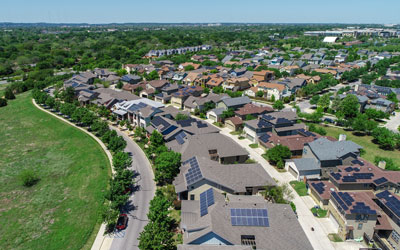As the world continues to seek cleaner and more sustainable sources of energy, community solar projects are emerging as a promising solution. These innovative initiatives allow individuals, businesses, and communities to collectively invest in solar energy generation, unlocking numerous environmental benefits. Community solar projects have a transformative power and a positive impact on the environment.
1. Reduction in Carbon Emissions:
Community solar projects play a vital role in reducing carbon emissions, one of the leading causes of climate change. By generating electricity from solar energy, these projects provide clean power that displaces the need for traditional fossil fuel-based electricity generation. According to the U.S. Environmental Protection Agency (EPA), for every megawatt-hour (MWh) of solar energy produced, approximately 998 pounds of CO2 emissions are avoided. With community solar projects, these emission reductions are multiplied as more individuals and businesses participate, leading to a significant reduction in greenhouse gas emissions.
2. Air Quality Improvement:
The transition to solar energy through community solar projects also has a direct impact on improving air quality. Traditional energy sources, such as coal and natural gas, contribute to air pollution, releasing pollutants like sulfur dioxide, nitrogen oxides, and particulate matter. These pollutants have detrimental effects on human health and the environment, leading to respiratory issues, smog, and acid rain. By embracing community solar, communities can reduce their reliance on fossil fuels, leading to cleaner air and improved public health outcomes.
3. Conservation of Natural Resources:
Solar energy is a renewable resource, unlike fossil fuels, which are finite and depletable. Community solar projects harness the power of the sun and convert it into clean electricity, without depleting valuable natural resources. By utilizing solar energy, we can reduce the strain on traditional energy sources like coal, oil, and natural gas. This, in turn, helps to conserve these finite resources for future generations, ensuring a sustainable energy future.
4. Preservation of Ecosystems:
Traditional energy extraction and generation methods often result in significant ecological damage. Community solar projects, on the other hand, have a minimal ecological footprint. Solar panels are typically installed on rooftops, parking lots, or other underutilized spaces, reducing the need for land clearance and ecosystem disruption. By embracing community solar, we can protect vital ecosystems, preserve biodiversity, and maintain the delicate balance of our planet’s natural habitats.
5. Water Conservation:
Conventional power plants require vast amounts of water for cooling and generation processes. This reliance on water places tremendous strain on water resources, especially in regions experiencing water scarcity or drought. Community solar projects, however, require minimal water for operation, as solar panels generate electricity through photovoltaic processes without the need for water. By adopting community solar, we can alleviate stress on water supplies, ensuring that this precious resource is available for other critical needs.
Community solar projects offer a compelling pathway toward a sustainable and environmentally friendly future. By reducing carbon emissions, improving air quality, conserving natural resources, preserving ecosystems, and promoting water conservation, these initiatives have a profound positive impact on the environment. As homeowners, businesses, and communities come together to invest in solar energy, we can pave the way for a greener, cleaner, and more sustainable world.
Massachusetts has been experiencing the benefits of solar power with the solar panel installations provided by Summit Energy. Embracing solar energy in Massachusetts is not only a responsible choice but also a powerful step towards mitigating the effects of climate change and safeguarding our planet for future generations. Let us join hands and drive the transition towards a brighter and more sustainable future through community solar initiatives.

